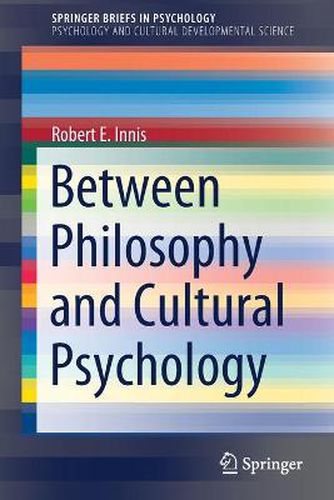Readings Newsletter
Become a Readings Member to make your shopping experience even easier.
Sign in or sign up for free!
You’re not far away from qualifying for FREE standard shipping within Australia
You’ve qualified for FREE standard shipping within Australia
The cart is loading…






This title is printed to order. This book may have been self-published. If so, we cannot guarantee the quality of the content. In the main most books will have gone through the editing process however some may not. We therefore suggest that you be aware of this before ordering this book. If in doubt check either the author or publisher’s details as we are unable to accept any returns unless they are faulty. Please contact us if you have any questions.
This Brief provides an in-depth discussion of five major points of intersection between philosophy and cultural psychology. The first chapter frames central analytical and normative threads, foregrounding the focal notion of thresholds of sense. The second chapter explores the nature of contexts, situations, and backgrounds of meaning-making following the lead of John Dewey, Ben-Ami Scharfstein, and Gernot Boehme. Chapter three examines the complementary analytical power of the semiotic resources developed in the work of Peirce, Buhler, and Cassirer. Chapter four shows the heuristic fertility and psychological bearing of Susanne Langer’s feeling-based aesthetic model of minding. The final chapter establishes affectivation as the inescapable consequence of human beings giving life to themselves by giving life to signs. The Brief concludes with three commentaries from leading researchers in the area. The chapters weave together interlocking themes: the nature of embodied perception, the variety of contexts and semiotic frameworks and their schematization of thresholds of meaning-making, the role of art and theories of imagination both in cultural psychology and in philosophy, and the centrality of feeling in all forms of meaning-making.
Between Philosophy and Cultural Psychology will be of interest to cognitive and cultural psychologists as well as researchers and upper-graduate students in philosophy and related psychology fields.
$9.00 standard shipping within Australia
FREE standard shipping within Australia for orders over $100.00
Express & International shipping calculated at checkout
This title is printed to order. This book may have been self-published. If so, we cannot guarantee the quality of the content. In the main most books will have gone through the editing process however some may not. We therefore suggest that you be aware of this before ordering this book. If in doubt check either the author or publisher’s details as we are unable to accept any returns unless they are faulty. Please contact us if you have any questions.
This Brief provides an in-depth discussion of five major points of intersection between philosophy and cultural psychology. The first chapter frames central analytical and normative threads, foregrounding the focal notion of thresholds of sense. The second chapter explores the nature of contexts, situations, and backgrounds of meaning-making following the lead of John Dewey, Ben-Ami Scharfstein, and Gernot Boehme. Chapter three examines the complementary analytical power of the semiotic resources developed in the work of Peirce, Buhler, and Cassirer. Chapter four shows the heuristic fertility and psychological bearing of Susanne Langer’s feeling-based aesthetic model of minding. The final chapter establishes affectivation as the inescapable consequence of human beings giving life to themselves by giving life to signs. The Brief concludes with three commentaries from leading researchers in the area. The chapters weave together interlocking themes: the nature of embodied perception, the variety of contexts and semiotic frameworks and their schematization of thresholds of meaning-making, the role of art and theories of imagination both in cultural psychology and in philosophy, and the centrality of feeling in all forms of meaning-making.
Between Philosophy and Cultural Psychology will be of interest to cognitive and cultural psychologists as well as researchers and upper-graduate students in philosophy and related psychology fields.